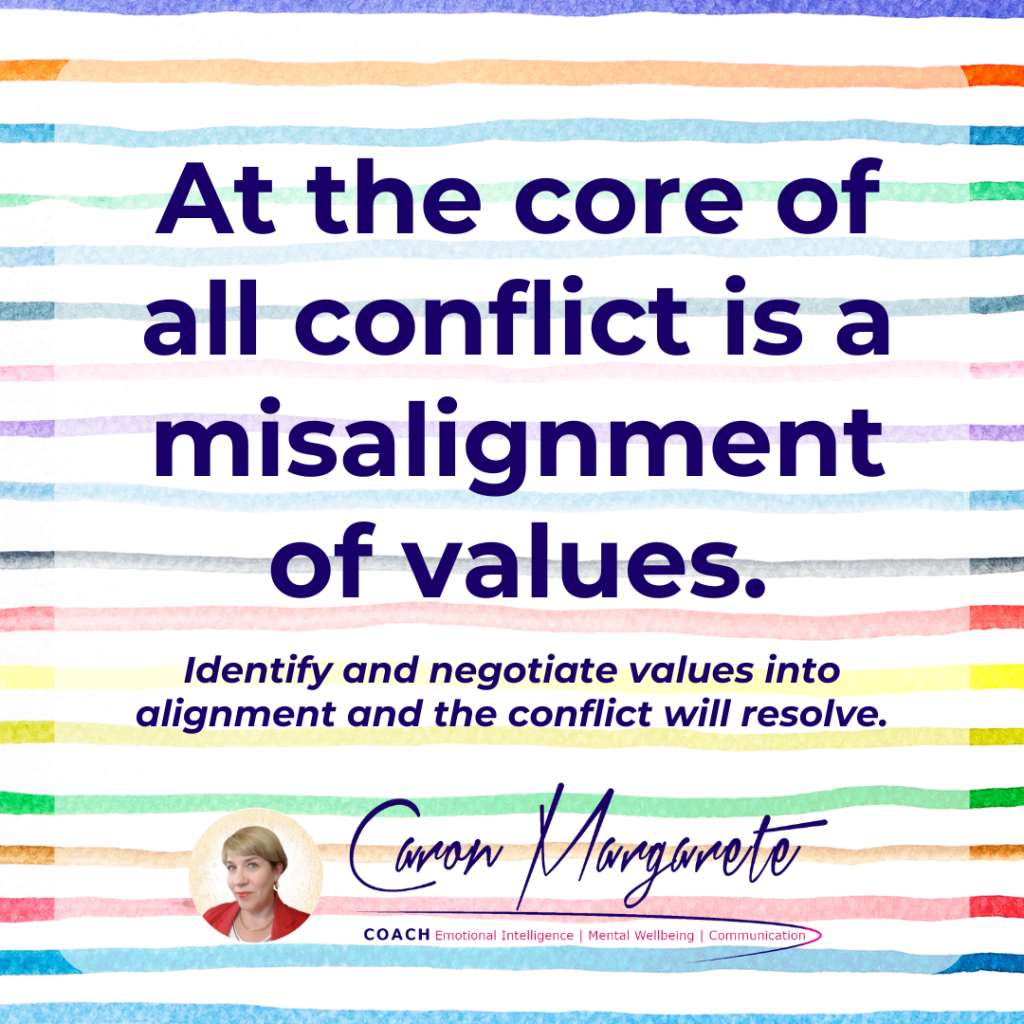Ah, conflict, you beauteous bitch, I’m onto you. I see you. At your core, you’re misunderstood. You just have values that aren’t lining up.
 In conflict, each person, team, department, organisation, or country involved has a set of values that are different from the opposing side.
In conflict, each person, team, department, organisation, or country involved has a set of values that are different from the opposing side.
Values are attributes that are important to us. They drive our thoughts, beliefs, attitudes, and actions, and they ought to also be the mechanisms that guide the decisions we make.
When we disagree with someone else, or someone treats us poorly, or there’s a miscommunication, or a decision has been made that we believe is wrong and not justified, these are all examples of our core values not being the same or similar to the other party.
If the relationship is worth it, then spend the time identifying the values you each have, working out the differences that are making the difference, and then negotiating new terms of engagement to resolve the conflict (I can help if you don’t know how).
But if the other party is not worth keeping in your life or the exercise of resolution is futile, recognise that the conflict is simply the result of a values misalignment. It’s really not about you at all. You find different things important, and that’s okay.
Until one country invades another, then it’s still about values, but the fight becomes about who is right and who is wrong. In which case, the necessary dialogue may take a bit longer because self-awareness, emotional expression skills, and the willingness to learn (& potentially have our minds changed) are required to counter the justification of emotionally-laded self-righteousness.
Here’s a real-life example of this that I have experienced:
CA is a small business that provided me with a service. I had a payment agreement with them to pay for their services on a monthly cycle for a set amount. At the time of this challenge occurring, I had paid nine of the twelve-month agreement without issue, and I had three payments remaining.
I began to experience profound financial challenges. I pre-empted difficulties paying, so I sought to be proactive and fiscally responsible. I contacted them over the course of three months to seek their support for either postponing or pushing back a payment, which they reluctantly provided, while making it clear to me that they were doing me a favour outside of their policy yet wanted to provide their clients flexibility. Up until this point, my experience with the company was that they were being genuinely compassionate and supportive.
When it became apparent to me that I would not be able to make the three remaining payments according to their payment schedule—that is, a monthly large payment direct debited—I offered to make incremental payments on a regular (weekly) basis until the balance was paid, with the full awareness that I would not receive the complete product I was paying for until the balance was paid.
Now, here’s where values begin to misalign.
They made an alternative proposal to mine, which was to pause all services until I could pay according to the original payment plan, but I never received a definitive ‘no’ to my proposal; instead, their emails said things like:
- “We strive to support our clients through their unique circumstances while balancing the operational necessities of our business.”
- “We believe this proposal maintains our commitment to your journey.”
- “Please let us know if this solution is acceptable or if you wish to discuss any alternative arrangements. Our goal is to work together towards a feasible solution.”
- “[We] appreciate your willingness to find a viable solution. We remain hopeful that we can work together towards an arrangement that supports your pursuits while aligning with our operational requirements.”
- “We await your response and are ready to proceed in a manner that best suits your needs.”
There is no question about it; they have every right to adhere to their established policies. That’s not a values misalignment. The misalignment comes from saying one thing and demonstrating the opposite.
Their company values are:
- Collaboration: We are partners in your expansion and success.
- Connection: We enable you to lead change and transformation.
- Courage: We empower you to navigate the unknown.
- Creativity: We are big on innovation and design thinking
- Respect: We honour each other’s values, differences, and contributions.
- Visionary: We thrive on big-picture forward-thinking.
Their emails focused on calling attention to all the ways they had accommodated my requests, which were outside their terms and conditions. There were only two changes; this proposal would be the third, but their emails were a verbose overemphasis on how much they’d done for me when they had not done much at all. On top of this, they used a lot of shame-inducing language with regards to my financial circumstances.
What they didn’t do was respond to the proposal I offered. They ignored it. That is not evidence of collaboration, connection, creativity, respect, or being visionary by considering the long-term repercussions of being rigidly fixated on the terms of their policies.
They didn’t acknowledge the negative emotions they’d triggered in me by the induced shame and guilt. They ignored my feelings. They ignored everything I called to their attention about my experience as their client. That is not a demonstration of connection, courage, or respect.
As a client, I did not have an expectation they would say yes to my proposal, and yet, I did think that with values like theirs, my experience would have been acknowledged, but it wasn’t. That’s where the disappointment really sinks in because my values are to care, collaborate, and communicate with integrity. The misalignment here is that I wasn’t feeling cared for, I was feeling ignored. I didn’t feel there was collaboration because my proposal had not been acknowledged. And I do not believe they communicated with integrity because their offers to work with me were disingenuous in intent.
As a consultant and director of my own business, I was stunned at how they treated their clients. Hurt, yes, but really, just really disappointed at their shortsightedness and fear. I was on the hook for the balance, I’ve never said I wouldn’t pay because I need the end product, but that they would get their money on a regular basis seemed to fall on deaf ears. You can spend hours analysing the who, what, where, why, and hows of this, but there is no point. They made their stance clear. There was only one option: It’s their way or the highway.
And so, I took the high road and disengaged from their service. I know what and how I will handle it in the future, but I had to establish distance to focus on other strategic priorities.
What I did wrong and what I would do differently
What I did wrong in this exchange was challenging for me to analyse because, as I said above, I’m acutely aware of how a lack of self-awareness, emotional expression skills, and the willingness to learn (& potentially have my mind changed) are required to counter the justification of emotionally-laded self-righteousness. At no time did I think I was right and they were wrong. Quite the opposite, I’m okay with receiving a ‘no’ answer if that answer is actually given.
Upon reflection, I can see that I was too trusting and too vulnerable. I thought my relationship with the director had psychological safety. I was wrong. The director used my experience against me to serve her agenda and my trust gave space to allow that to happen. Had I said less, asked for less, not asked for help then I would still have the same outcome of my account paused but they wouldn’t have knowledge of me to shame me with.
I think what I would’ve done differently is nipped this in the bud quicker. Instead of continuing the email conversation with someone in Support, I ought to have sought to be more pragmatic and escalate the issue by booking a phone conversation to cover off the challenges I was experiencing with the shame-inducing language and the feeling of not being heard or understood with the director. I later learned that the emails I was receiving from Support were actually written by the director and sent to me under false pretences. The director could’ve ended this earlier too, but for some reason she let the game go on.
There was much to learn from the experience, most importantly what not to do.
Conclusion
By recognising in this example that my values were not aligned with their values or their actions, I was able to separate the ‘me’ from the ‘them’ of the experience. Their actions told the story of how their actions are not in alignment with their company values, and if that’s the way they want to treat their clients, then so be it. That’s not on me. If I cared enough about the director or the business, I would put the work in to reestablish rapport, even if they’d never again be trusted, but I don’t care, which comes back to my values.
I have to care. I have to genuinely give a shit about who they are to be willing to demonstrate how they’re not operating in alignment with what they say. I have to care enough to want to help. I have to care enough to be even more vulnerable. I cannot care because they’ve shown what they do with their client’s vulnerability.
By identifying the underlying values in a conflict and then deciding if you care enough to put in the work, you can resolve any conflict. It takes work, it takes honesty, the ability to want to see the negative side of who you are, and the willingness to acknowledge how you failed. Only then can you negotiate new terms of an engagement.
If all that sounds too hard, don’t engage. Your values are equally important.

